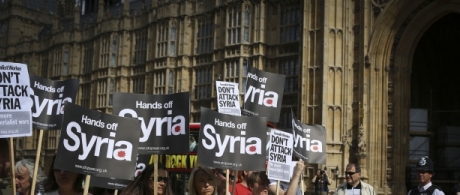Σημαντικές κινήσεις σημειώνονται στη "σκακιέρα" των υδρογονανθράκων της Αν. Μεσογείου, και ενώ η ευρύτερη περιοχή βρίσκεται επί ποδός πολέμου λόγω του ενδεχομένου δυτικής επίθεσης στη Συρία.
Από τουρκικής πλευράς, το ερευνητικό πλοίο «Μπαρμπαρός Χαϊρεττίν Πασά» αναμένεται τις επόμενες ημέρες να εκτελέσει σεισμικές έρευνες στην κυπριακή ΑΟΖ (πιθανώς στα οικόπεδα 5 και 6), παραβιάζοντας τα κυριαρχικά δικαιώματα της Κύπρου. Το πλοίο δεν αναμενόταν στη Μεσόγειο πριν τα τέλη Σεπτεμβρίου, αλλά το πρόγραμμα ερευνών του επισπεύστηκε και ήδη πλέει στην περιοχή. Το γεγονός ίσως συνδέεται με τις κυπριακές κινήσεις των τελευταίων ημερών, καθώς το "άναμμα" της φλόγας του φυσικού αερίου στο οικόπεδο 12 (δεν έγινε σήμερα λόγω τεχνικού προβλήματος αλλά αναμένεται σύντομα) επιβεβαιώνει τη δέσμευση της Κύπρου να προχωρήσει στην εκμετάλλευση των φυσικών της πόρων. Ο τουρκοκύπριος "πρωθυπουργός" Ερογλου διατύπωσε έμμεσες αλλά σαφείς απειλές λέγοντας ότι "οι περισσότεροι πόλεμοι στη Μ. Ανατολή ξεκίνησαν για το πετρέλαιο και ελπίζουμε να μη συμβεί το ίδιο στην Κύπρο" - και η αποστολή του ερευνητικού σκάφους πιθανώς αποτελεί μια δήλωση της Τουρκίας, ότι εμμένει στις διεκδικήσεις της.
Από τουρκικής πλευράς, το ερευνητικό πλοίο «Μπαρμπαρός Χαϊρεττίν Πασά» αναμένεται τις επόμενες ημέρες να εκτελέσει σεισμικές έρευνες στην κυπριακή ΑΟΖ (πιθανώς στα οικόπεδα 5 και 6), παραβιάζοντας τα κυριαρχικά δικαιώματα της Κύπρου. Το πλοίο δεν αναμενόταν στη Μεσόγειο πριν τα τέλη Σεπτεμβρίου, αλλά το πρόγραμμα ερευνών του επισπεύστηκε και ήδη πλέει στην περιοχή. Το γεγονός ίσως συνδέεται με τις κυπριακές κινήσεις των τελευταίων ημερών, καθώς το "άναμμα" της φλόγας του φυσικού αερίου στο οικόπεδο 12 (δεν έγινε σήμερα λόγω τεχνικού προβλήματος αλλά αναμένεται σύντομα) επιβεβαιώνει τη δέσμευση της Κύπρου να προχωρήσει στην εκμετάλλευση των φυσικών της πόρων. Ο τουρκοκύπριος "πρωθυπουργός" Ερογλου διατύπωσε έμμεσες αλλά σαφείς απειλές λέγοντας ότι "οι περισσότεροι πόλεμοι στη Μ. Ανατολή ξεκίνησαν για το πετρέλαιο και ελπίζουμε να μη συμβεί το ίδιο στην Κύπρο" - και η αποστολή του ερευνητικού σκάφους πιθανώς αποτελεί μια δήλωση της Τουρκίας, ότι εμμένει στις διεκδικήσεις της.



